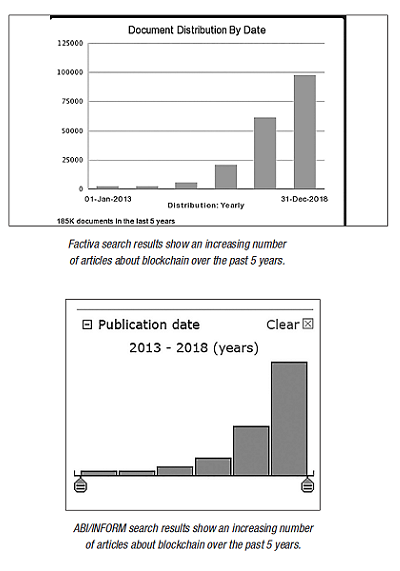Blockchain, although a relatively new technology, has ignited a tremendous amount of interest. The enthusiasm of supporters and early adopters borders on the fanatical. Its distributed ledger system—marked by decentralization, unique and immutable transactions, and data stored in secure, verifiable, and permanent blocks—is gaining advocates in many disciplines and industries worldwide. Its origins, rooted in Bitcoin and other cryptocurrencies, do not obscure its appeal for other types of transactions. For a description of the technology and definitions of blockchain terminology, see Richard Hammond’s January/February 2018 Online Searcher article, “Blockchains, Sealing Wax, and Disruptive Technologies,” pp. 10–16.
If you think you have been seeing more about blockchain recently, you are not alone. Searches in Factiva and ABI/INFORM reveal a similar pattern of increased information about blockchain technology being published. A Statista report shows the size of the market, with projections to 2021 steadily increasing, and, according to the Stanford Centre for Social Innovation, new projects, organizations, and platforms are also growing.
The advantages of blockchain are counter-balanced by controversies about privacy issues. In an era of deepening concern about data security, blockchain appears to be attracting as much criticism as support across the globe. This article examines the comments, advice, and concerns of technology experts and shares their perceptions of blockchain in light of the increasing hype around this technology. The speed of change in communication and technology is creating serious disruption for information professionals.
 I spent years as a writer, editor, and consultant in tech industries before entering academia, and one thing has always been clear to me: Technology is neutral, not “bad” or “good.” However, the potential for misuse is almost impossible to foresee, and the costs of damage have grown massively. For information professionals, the issue of privacy/security of information and the need to carefully protect certain categories of information are core to our work and legitimacy.
I spent years as a writer, editor, and consultant in tech industries before entering academia, and one thing has always been clear to me: Technology is neutral, not “bad” or “good.” However, the potential for misuse is almost impossible to foresee, and the costs of damage have grown massively. For information professionals, the issue of privacy/security of information and the need to carefully protect certain categories of information are core to our work and legitimacy.
INFORMATION PROFESSIONALS FACE BLOCKCHAIN
This year, with funding from the Institute of Museum and Library Services (IMLS), the San Jose State University (SJSU) iSchool has initiated the first major examination of blockchain and its potential impact on information services (imls.gov/grants/awarded/LG-98-17-0209-17; ischoolblogs.sjsu.edu/blockchains). “It is time to examine the possible ways that libraries can support city/community goals through the use of blockchains while the implementation of the technology is still in the infancy stage,” Susan Alman, SJSU instructor and project director, notes on the iSchool website (ischool.sjsu.edu/center-information-research-and-innovation-ciri/projects/featured-projects/blockchain-technology). The school is currently investigating ways that blockchain technology might be used “as a community anchor to partner with other organizations and to support city/community goals” (library20.com/page/call-for-proposals-blockchain). The school sponsored a conference in June 2018 (youtube.com/c/Library20) and will be using the IMLS grant to support another meeting that was scheduled to take place on Aug. 6, 2018 (ischoolblogs.sjsu.edu/blockchains/national-forum). It expects to release a report on the findings and observations of the meeting in fall 2018.
The IMLS grant is intended to study the feasibility of block chain technology to help libraries expand and extend their ser vices by “developing a distributed, permission-less metadata archive; creating a protocol for supporting community-based collections; and facilitating better digital rights management.”
Sandra Hirsh, director of the SJSU iSchool, has a long history of research and scholarship, user/information-seeking behavior, technology use, and online experiences and communities. As research continues on the IMLS Blockchain grant, Hirsh tells Online Searcher, “I think we will be in a better position to comment on some of these things after we have held our National Forum in early August and have had a chance to digest what we have learned through our year of exploration.” However, there are plenty of experts, pundits, and technologists with opinions, as well as a few very interesting projects underway that might help explore not only the issues, but point to potential applications for this technology that could revolutionize web-based information services.
SUPPORTERS, SPONSORS, AND QUESTIONS
Blockchain has the strong, active support of a wide variety of industries, companies, and professional and association groups. Blockchain exists as an ISO standard (iso.org/committee/6266604.html; ISO/TC 307). It is under consideration as a European Union ITU-T standard (ec.europa.eu/newsroom/document.cfm?doc_id=47036). The Chinese government has begun a process to have a comprehensive frame work for blockchain standards completed by the end of 2018 (coindesk.com/china-poised-to-form-blockchain-standards-committee-this-year). An IEEE initiative for blockchain has also been launched (blockchain.ieee.org). All these efforts are critical in establishing strong, clear standards for the distributed processing of key user data worldwide.
Hexayurt.Capital founder Vinay Gupta, in a March 6, 2018, article in Harvard Business Review (“The Promise of Blockchain Is a World Without Middlemen,” hbr.org/2017/03/the-promise-of-blockchain-is-a-world-without-middlemen), notes:
We’re going to see the potential for a trajectory of radical change in all industries. As a society, we’re experiencing a time of unprecedented technological change. It can feel like an insurmountable challenge for leaders to stay on course in such rapidly changing tides. And yet, with each passing generation, we are acquiring more skill and expertise in navigating a high rate of change, and it is to that expertise that we must now look as the blockchain space unfolds, blossoms, and changes our world.
However, many are far more skeptical.